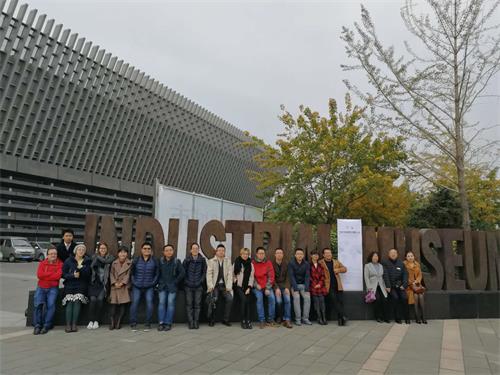Co-innovation: Sino-German Workshop for Sustainable Energy Transition
On 13-15 October, 2017, the “Sino-German Workshop for Sustainable Energy Transition” was successfully held in IAE. The workshop was initiated and co-hosted by IAE, Institute for Advanced Sustainability Studies (IASS), Germany and the Center for International Science and Technology Exchange of Liaoning Province (ISTE), for gathering disciplinary understandings as well as for creating new knowledge towards a multi-stakeholders-based dialogues for sustainable energy transition.
At opening ceremony which was conducted by Dr. XUE Bing, Party Secretary Prof. Dr. JI Lanzhu from Shenyang Branch CAS, Director Prof. LUO Naiming from ISTE, and Dr. Sophia Becker from IASS delivered welcome speech, respectively. The Section Chief of Personnel Office of IAE, Mr. YE Hanfeng joined in the opening ceremony. More than 90 high ranking scientists and participants from research units, industry and civil society. Among them, 6 from European (4 from Germany and 2 from French) and 85 from China. In total, 28 presentations were delivered in the workshop, including 8 keynote speeches and 20 thematic presentations, with the topics covering the studies and projects on transport, electricity and smart grid, legislation, and system integration.
Energy issue has been one of the most important factors, for our planet’s sustainable development, on the one hand, it offers the driving forces, for social-economic development, and on the other hand, the great amount consumption, of the fuel fossil also caused heavy pollutions at both international and local levels, such as local air pollution, global warming, and, regional-crossed conflicts. Under such situation, that of finding a way towards sustainable energy transition has been one of the key issues for meeting SDGs 2030, either for developed and post industrialized countries such as Germany, or for developing countries and economies, such as China. In Oct 2014, Chinese Premier Li Keqiang and German Chancellor Angela Merkel agreed to put emphasis on innovation cooperation so as to further promote bilateral ties, and emphasized that both China and Germany will work together to deepen energy-dialogues and figure out the systemic solutions towards sustainable future. In 2016, funded by the BMBF, the Kopernikus project was launched, one of its key objectives is to gain a deeper understanding of the complex networked energy system in the energy sector and related fields, to show options for action on how the components of the future energy system can be systematically integrated taking into account the energy policy objectives and boundary conditions as precisely as possible, the consequences of a specific measure in the short, medium and long term on the energy system, and finally, in the transdisciplinary discourse, to generate options for effective measures.
With the aim of “promoting across discipline dialogue, multi-body cooperation and form cross-field knowledge network”, this workshop distributes comprehensively analysis on the status, perspectives, opportunities and challenges in current energy system and shared successful experiences and typical examples through policy explanation, expert speech and subject dialogue. For example, by the year 2020, Germany aims to have 1 mio electric vehicles (EVs), while China aims to have 5 mio. EVs. Recently, China decided to introduce the new law that 10 % of all vehicles sold in China must be EVs (from 2019 onwards) and that the batteries must be from Chinese producers. This intensifies the pressure on German car manufacturers to increase their EV sales on the Chinese market within a short remaining time frame. Europe and Germany discuss about a quota for EVs and different regulatory approaches for a faster run-up of the market, too. But there is discussion about more technology-neutral approaches, too, to give other environmentally friendly technologies (full cell, synthetic gas etc.) there appropriate share in the energy transition in traffic (presentation by Matthias HARTWIG, IKEM Berlin). A key factor in both countries is the wider adoption of EVs by consumers. The first results of a comparative empirical study on EV buyers’ motives (presentation by Julia Jarass, DLR Berlin & Sophia BECKER/Bing XUE, IASS Potsdam) reveal that both Chinese and German EV buyers are attracted by the low energy costs and the environmental benefits of EVs. At the same time, the image of EVs still needs to improve considerably in both countries, even though Chinese customers have a more positive attitude towards EVs. Thanks to important tax benefits (subsidies up to 16,000 $US) in China, the stock of EVs has grown to 642,000 in the year 2016- compared to about 51,000 EVs in Germany.
However, until now, no comparable project like ENavi exists in China. The Chinese participants were highly interested in the innovative transdisciplinary project design of ENavi (presentation by Sophia BECKER, IASS Potsdam). Even though some civil society actors such as Greenpeace (presentation by Jing YAN, Greenpeace China) have elaborated concepts and goals for the Chinese energy transition (“Respecting Environmental Boundaries, Changing Mindsets, Changing Power Dynamics”), they are currently not directly involved in large-scale research projects. Chinese participants valued the project design of ENavi very much and found it very inspiring. They stated the need for similar research architecture in China and would like to collaborate further with ENavi.
During three on-site visits on Sunday, starting with the Chinese Industrial Museum, the participants had the chance to experience the industrial awakening of China in Shenyang in the 50th and 60th of the last century leading to its position in the energy transition today. The visit in a water treatment plant showed the progress in heat recuperation for district heating. Furthermore, a visit at a cero-energy house demonstrated the application of modern heat pumps and heating/cooling technology.
The form was highly recognized and evaluated by the press. Seven journalists reported instantly about the workshop results, including 163.com, ln.xinhuanet.com, ifeng.com, and ln.people.cn.
The series of Sino-German Workshop has been a brand of co-innovation activities initiated by the IAE, IASS and ISTE, by focusing on specific topic each year, for example, the topic in 2016 was “Co-benefits”, and for next year is planned as “Industrial Base Redevelopment”.

| Download the attachment: |



